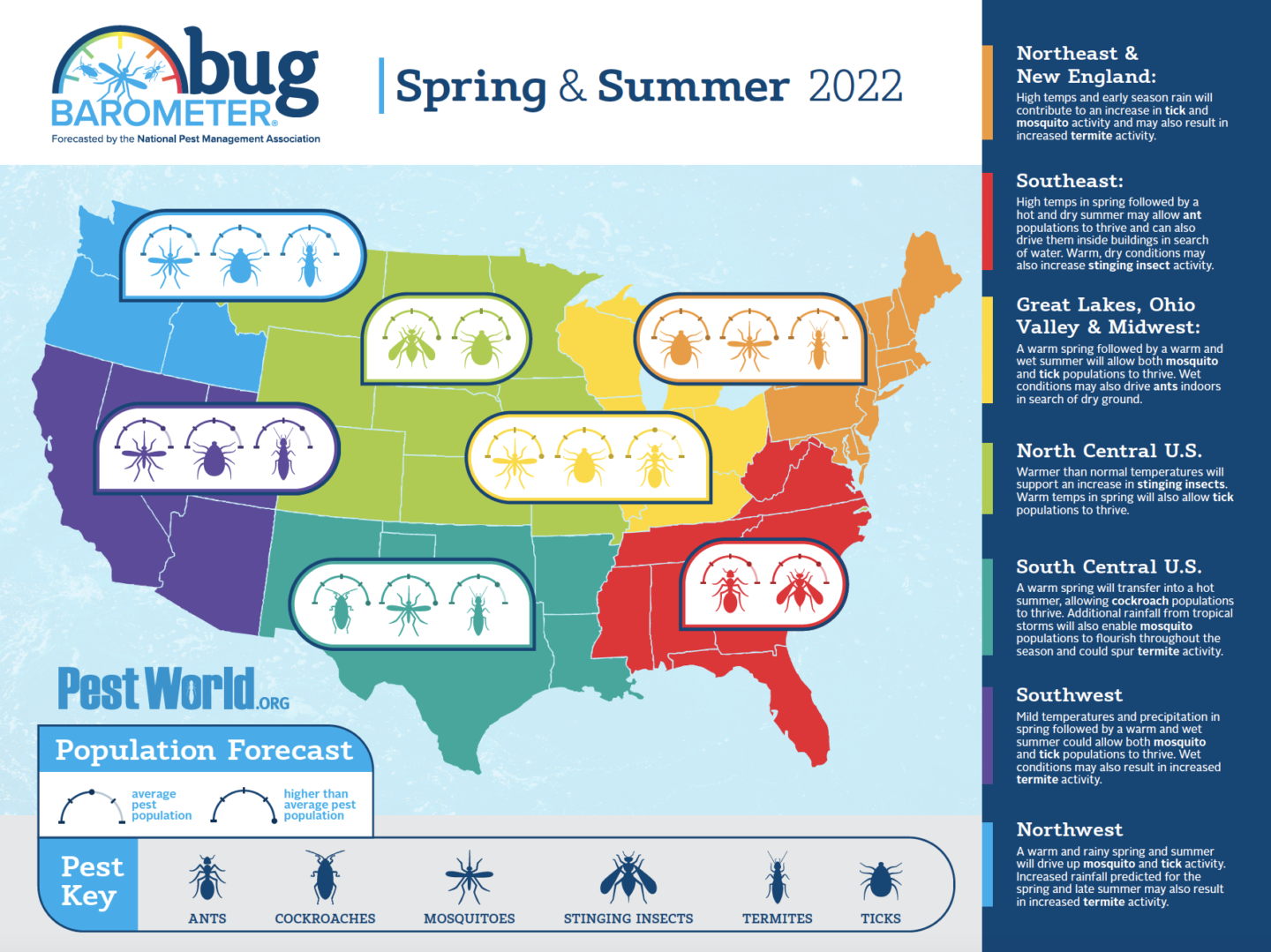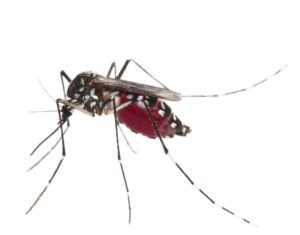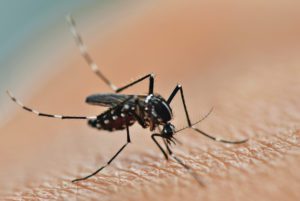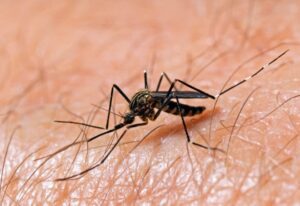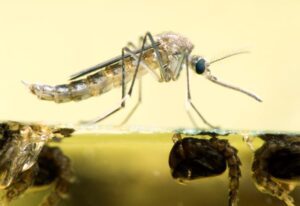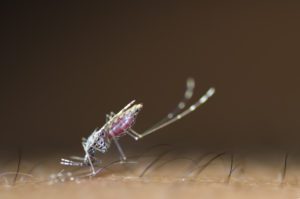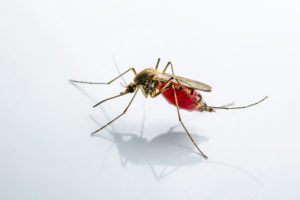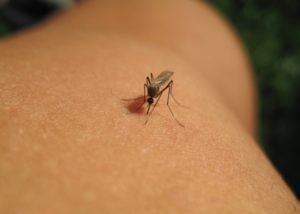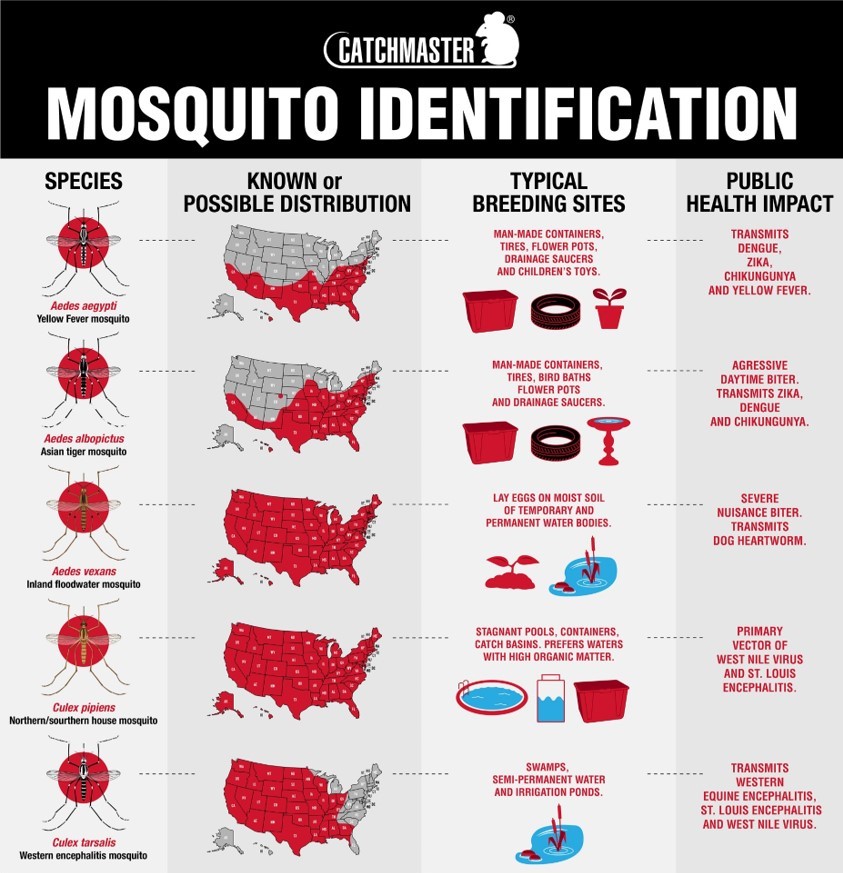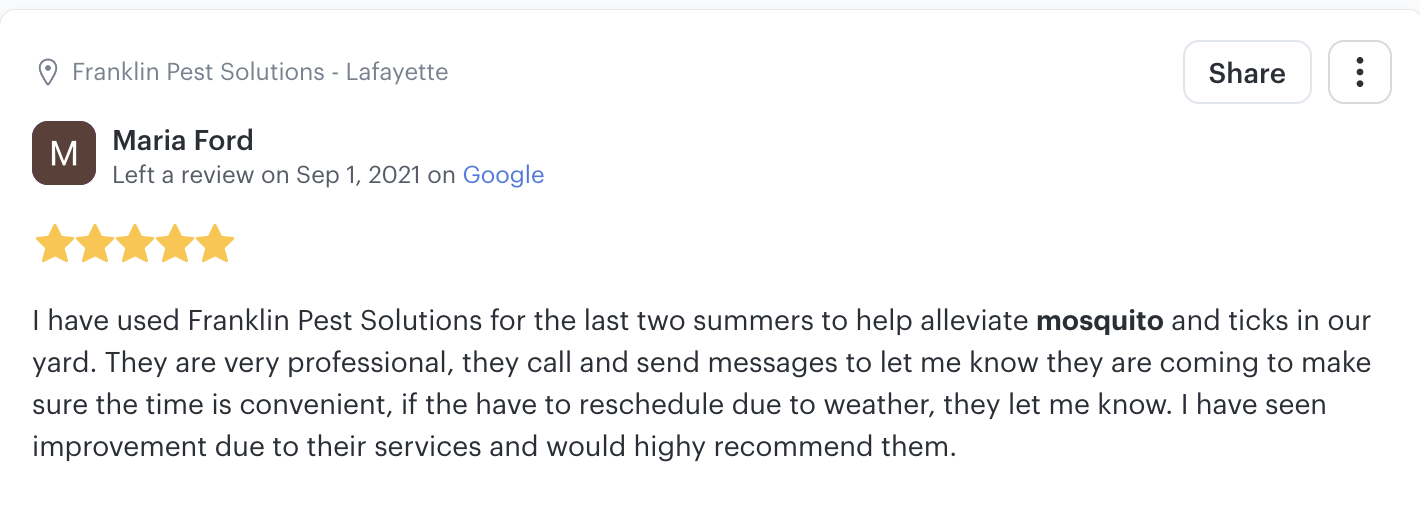We’ve had an odd spring. April was so cold! And then all of a sudden the sun showed up and woke every plant and insect and animal out of slumber. Literally everything started crawling out of the woodwork. Add in all the rain we’ve had and BAM. Flies, stink bugs, termites, ANTS ANTS ANTS. We went from about 200 phone calls to over 1000 per day seemingly overnight. It’s crazy to think we’re already talking about mosquito prevention tips.
Summer Pest Forecast
The National Pest Management Association has released the official Spring and Summer 2022 Bug Barometer. We’re not surprised that mosquitoes are in our future here in the Midwest. They’ve had the perfect recipe for breeding conditions. Use this as a guide both for your home and if you plan to travel to different parts of the country and continue reading below for helpful mosquito prevention tips.
“A warm spring followed by a warm and wet summer will allow both mosquito and tick populations to thrive. Wet conditions may also drive ants indoors in search of dry ground.”
Mosquitoes, and why they’re the worst.
Mosquitoes are predicted to be the worst overall over any other pest this summer. Dawn and dusk used to be what we knew to be peak mosquito biting times. But there are a couple of different species of mosquito in our area now that are daytime biters. Each species has its own characteristics. The Asian Bush Mosquito is the most recent species being identified in backyards. Here are the species of mosquitoes we’re seeing most frequently in our area.
Aedes aegypti
- aka yellow fever mosquito
- feeds at dusk and dawn and will make their way indoors
- prefers cool shady areas out of the wind
- more likely to feed on humans than animals
- breeds in stagnant water, specifically planter pots, bird baths, buckets, toys, puddles, tires
- will also breed in wet showers and toilets indoors
- spreads dengue fever, Zika virus, Chikungunya, and is a vector of over 50 more pathogens
Aedes albopictus
- aka Asian Tiger Mosquito
- more likely to feed on animals than humans
- primarily thrives in forest areas
- aggressive day biter but will also feed at dusk and dawn
- will bite a host more than once
- spreads dengue fever, Zika virus, Chikungunya, and is a vector of over 50 more pathogens
- black and white striped pattern on their legs and abdomen
- weak fliers
Aedes japonicus
- aka Asian Bush Mosquito
- most recent species identified in our areas
- daytime biter
- backyard breeder that loves containers
- survives subzero temperatures
- eggs overwinter and activate in the spring with moisture/rain
- highly adapted to humans
- don’t travel far from a water source
- feeds primarily on mammals and birds
- disease transmission is still unknown because it’s still newly being studied
- weak flier
Aedes vexans
- aka Inland Floodwater Mosquito
- found in all 50 states
- lays eggs on moist soil
- transmits dog heartworm
- severe nuisance biter
- eggs are activated by spring floodwaters
- capable of migrating a few miles
- worst in May and June
Anopheles quadrimaculatus
- aka Malaria mosquito
- rests its body at an angle
- prefers to lay eggs near streams, ponds, lakes with aquatic plants
- lays eggs one at a time on the surface of the water
- eggs have built-in rafts to allow them to float
- larvae lay horizontally just below the surface of the water
- larvae eat tiny plant and animal matter on the surface of water
- don’t fly far from water breeding source
Culex pipiens
- aka House mosquito
- primary vector of West Nile Virus and St. Louis Encephalitis
- loves stagnant pools, containers, planters, sewage tunnels and puddles
- prefers water with high organic matter counts
- found in all 50 states
- likes wet, humid, moist areas
- feeds on nectar and plant sugars as well as mammals and birds
- females do a rejection kick sometimes when males try to mate
Culex Tarsalis
- aka Encephalitis Mosquito
- known vector of St. Louis Encephalitis and Western Equine Encephalitis and avian viruses (birds)
- lays egg rafts on water surfaces containing about 190 eggs
- most active at dusk
- feeds on mammals and birds like house finches and sparrows
- once birds avoid these mosquitoes, they’ll look to feed on other mammals, like humans
- sunlit standing water dwellers
- black mosquito with white bands on its legs
Mosquito Prevention Tips
- Apply repellent according to the label
We can’t always control the environment around us or know what the weather will trigger, but the best thing we can do is protect ourselves. Apply insect repellent according to the instructions. Just like sunscreen when you’re outdoors, you may need to reapply to be sure you’re protected. Make sure you watch this how-to apply insect repellent video and read our previous blog post with all of our best practices and recommendations!
2. Be diligent about eliminating standing water on your property
Flipping over toys and pools is just not good enough. Container breeder mosquitos only need the amount of water that fits into a bottle cap to breed. A lot of planters with drainage saucers, bird baths, toys in the yard have lips and ridges on them. The small drops of water that could collect in those is enough for a mosquito breeding ground. So be thorough about eliminating any standing water. Especially after it rains!
3. Get a fan blowing where you’re sitting.
Most of our backyard breeding mosquitos are not strong fliers. If you’re sitting outside at a patio table or on the deck and your legs and ankles are getting bitten. bring a small fan out and aim it towards your legs. Mosquitoes won’t be able to fight the strength of the wind.
4. Consider a mosquito prevention program
Our mosquito service is tried and true and our customers swear by it. It makes entertaining, cooking out, and relaxing in the yard so much more enjoyable! With at least 85% population reduction guaranteed, it makes a huge difference. We offer a one-time mosquito service for graduations, weddings, outdoor parties, etc. And monthly prevention services through the summer months. The package is so much more affordable that you’d imagine! It’s totally worth your comfort and peace of mind. Ask us for a free quote today!

